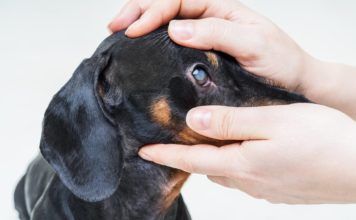Are Acorns Toxic to Dogs?
Let sleeping dogs lie next to you?
[From Tufts May 2011 Issue]
An article in a scientific journal published by the Centers for Disease Control and Prevention made headlines nationwide when it warned that people can - and often do - get too close to their dogs. Bruno B. Chomel of UC Davis and Ben Sun of the California Department of Public Health, writing in Emerging Infectious Diseases, said that about 50 percent of owners in the U.S. allow their dogs to sleep on their beds, but doing so puts them at risk for health problems.
Fact or Fallacy? Dogs need to eat meat
[From Tufts May 2011 Issue]
While dogs need dietary protein and essential amino acids, and meat has proven to be an excellent source of both, they can meet their requirements from other sources such as egg, dairy and vegetable proteins like soy. However, the best canine diets for completeness, palatability and digestibility include some meat, says nutritionist Sally C. Perea, DVM, MS.
Myth: Indoor dogs cant get heartworm
[From Tufts July 2011 Issue]
A myth persists that dogs who live indoors with only brief trips outside don't need protection against heartworm. The reality about the disease — which is spread by mosquitoes — comes down to simple mathematics. "Dogs bitten by more mosquitoes are at increased risk of developing heartworm disease when compared with dogs bitten by fewer mosquitoes," says Michael Stone, DVM, a specialist in internal medicine at Cummings School of Veterinary Medicine at Tufts University.
10 easy steps to successful vet visits
[From Tufts July 2011 Issue]
Whether you're taking your dog to the veterinarian for a routine checkup or treatment of a chronic health problem, you want to get the most from the appointment. Follow these 10 simple steps and you're on your way to a successful visit:
Summer brings outdoor fun – and risks
[From Tufts July 2011 Issue]
Warm weather encourages owners and dogs to spend more time outside. While summer offers outdoor fun, it's easy to overlook dangers that could harm your dog, says Scott Shaw, DVM, a specialist in emergency and critical care at Cummings School of Veterinary Medicine at Tufts University.
Fireworks top the list for risky business. "Dogs shouldn't be around fireworks at all," Dr. Shaw says. "They can chase thrown fireworks and get burned or injured." Some fireworks contain toxic substances that can poison dogs if chewed or swallowed. The explosions also can scare them. "The same dogs that are afraid of thunder will freak out on the 4th of July," he says.
Why does Cappy lick his owners hand?
[From Tufts August 2011 Issue]
Last year I purchased a 3-month-old mahogany colored poodle with green eyes - a beautiful dog. I have had mostly springer spaniels for many years, and this guy has a habit that stumps me.Cappy will take my wrist or hand gently in his mouth and rub his tongue across my skin. I have asked many experts what he is doing, but none can come up with an answer except, He owns you. Is there some reason he does this?
Irene Byington
Shelter Island, N.Y.
Itching and biting cause ‘pure misery’
[From Tufts November 2011 Issue]
My 4-year-old Lab-golden mix, Sam, has suffered since puppyhood with severe itching. He would lie around whining and crying all the time while scratching and biting himself. He was living in pure misery. My vets first attempt at help was Benadryl. When this did no good at all, we went to prednisone, still no help.
Does a warm, dry nose indicate illness?
[From Tufts December 2011 Issue]
Folk wisdom has long held that a warm, dry nose means a dog is sick. Veterinarians frequently hear the comment from owners, says Michael Stone, DVM, a specialist in small animal medicine at Cummings School of Veterinary Medicine at Tufts University, but the truth is that its a fallacy in most cases.
Tan-Tan Chases Anything That Moves
[From Tufts December 2011 Issue]
We want to know how we can help my dog. Tan-Tan is a 4-year-old, 60-pound German shepherd mix. When she sees squirrels, deer, etc., in the woods, she runs and chases them. She also does this when she sees cars on the street. We try to distract her with treats and call her name; however, nothing works. Once she sees something moving, she can focus only on one thing. In the house, she is very good following commands. Is there anything we can do help her?






